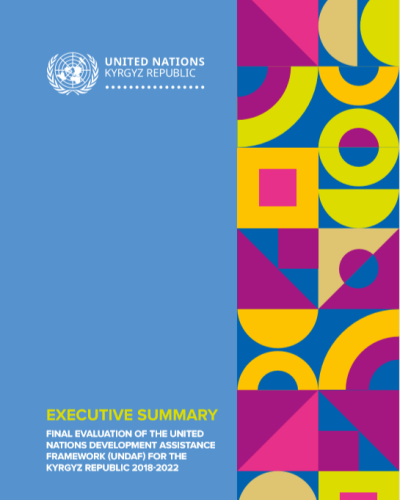Executive Summary of the Final Evaluation of the United Nations Development Assistance Framework (UNDAF) for the Kyrgyz Republic 2018-2022

This report presents the main findings, conclusions and recommendations of the final evaluation of the United Nations Development Assistance Framework (UNDAF) for the Kyrgyz Republic 2018-2022, which is a medium-term strategic planning document that articulates the collective vision and response of the UN system to national development priorities and outlines the activities implemented by the UN in partnership with the Government of Kyrgyzstan and in close cooperation with international and national partners. The UNDAF is framed around four priority areas, each with a corresponding outcome – namely, sustainable and inclusive economic growth; good governance, rule of law, human rights and gender equality; environment, climate change, and disaster risk management; and, social protection, health and education. The evaluation assessed the achievement of expected results and the extent to which UN’s contribution to the national development process under the UNDAF 2018-2022 and its outcomes has been effective, coherent, sustainable, and cost efficient.
The evaluation was conducted by a team of three independent experts who worked closely with the United Nations Resident Coordinator’s Office (UNRCO), UNCT and other UN structures in the country. The process was based on the Organization for Economic Co-operation and Development’s Development Assistance Committee (OECD DAC) criteria and definitions and followed norms and standards established by the UN Evaluation Group. The methodology consisted of mixed methods and involved the use of commonly applied evaluation tools such as documentary review, questionnaires, interviews, surveys, focus group discussions, information triangulation, analysis and synthesis.
A participatory approach was used for data collection, and formulation of recommendations and lessons learned. The evaluation engaged members of the UNCT, UN staff, government officials, development partners, and representatives of human rights institutions, civil society organizations and the private sector, were captured in the evaluation process. The evaluation engaged all UN agencies through individual questionnaires. 26 UN staff members participated in an online survey organized for this evaluation. Similarly, 28 Government officials, 37 civil society representatives and 8 development partners representatives participated in three separate online surveys. Additionally, individual meetings with key Government institutions were organized by the evaluators. Also, a focus group discussion was held with civil society organizations.
All possible efforts were made to minimize potential limitations to the evaluation process. A challenge encountered during the evaluation process was the inability of the evaluators to conduct field visits and have in-person interviews with key stakeholders due to the COVID-19 pandemic. To mitigate these limitations, the evaluation team made use of a number of data collection instruments to enable the engagement of greater number of stakeholders – the most crucial of these instruments were surveys with staff members from UN agencies and government organizations engaged in the implementation of activities with UN agencies.





















